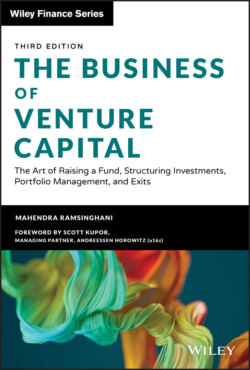Читать книгу The Business of Venture Capital - Mahendra Ramsinghani - Страница 23
Оглавление2 Why Choose a Career in VC
Fueling the frontiers of innovation, being an agent of change, supporting the next generation founders, asymmetric financial gains, freedom/autonomy from the 9-to-5 drudgery, or the thrill of building companies — the role of venture capitalists is never dull. If anything, it is like a drug — easy to get hooked and high, harder to let go.
CREATIVE CONSTRUCTION
One of the influential economists, Joseph Schumpeter, coined the term creative destruction, where industries are decimated when innovative trends occur: The “gale of creative destruction” whips through the “process of industrial mutation that incessantly revolutionizes the economic structure from within, incessantly destroying the old one, incessantly creating a new one.” On the other side are where the forces of creative construction, entrepreneurs and venture capitalists, are at work. When a paradigm shift occurs in any technological ecosystem, it is more likely that a founder and some venture capital investors are stoking that disruptive entrepreneurial fire. “See, venture capital is reducible to a few words. You have to be interested in managing change, and you have to recognize that change is necessary,”1 says Donald T. Valentine, founder of Sequoia Capital. To be a part of creating that new new thing can be immensely satisfying.
INTELLECTUAL STIMULATION
A career in venture capital investing is “the most fun you can have with your clothes on,” says Deepak Kamra of Canaan Partners.2 A day in the life of a venture capitalist is full of stimulating conversations with entrepreneurs who are changing the world. At various points in their startup journey, entrepreneurs seek investors, not only for the moolah but to test assumptions, validate their concepts, and prepare for the road ahead. Amid all these caffeine-laden dreams, the investor is exposed to a steep learning curve of technological changes, the shifting sands of market dynamics, sources of opportunity, and competitive constraints. For those who thrive on comfort in ambiguity, a rapid pace, headbutting with type A entrepreneurs, and “those crazy ones,” the career path of venture capital offers it all. Elizabeth “Beezer” Clarkson, managing director of Sapphire Ventures, says, “We forget how unusual this career is. We are privileged. Other sectors seem pale in comparison when we look at the range of energy and creativity that flows to us. It can be addictive.”
MENTOR CAPITALISTS
Those who have had a successful entrepreneurial journey often see venture capital as a pathway of imparting their lessons to the founders and entrepreneurs. “At a certain point in your career, it is more satisfying to help entrepreneurs than to be one,” says Marc Andreessen, co-founder of Andreessen Horowitz.3 Scott Weiss joined Andreessen Horowitz after selling his company, IronPort Systems, to Cisco. “Being a venture capitalist gives me the opportunity to mentor and offer direction to the entrepreneurs. They trust my judgment because I have been down this path before,” he points out. Several practitioners agreed that the VC career path allows them to continue to live vicariously through supporting other entrepreneurs.
ASYMMETRICAL REWARDS
Venture capital is an “antifragile” career with fundamental asymmetry. Hourly wage earners get paid for time, not value. This may be one of the few career paths that offer exponential financial returns while bringing innovation and positive change to society. In his book Antifragile, author Nicholas Naseem Taleb defines asymmetry to be when you have more upside than downside and tend to gain from volatility, randomness, stressors, errors, time, and uncertainty. Venture capitalists thrive on information asymmetry. They have a ringside view of the technological future, and the companies they have funded are often the ones to become the next-generation behemoths. Financial gains are expected as a byproduct of value creation, but only after asymmetry is identified and realized.
Exhibit 2.1 The perks of being a VC in Silicon Valley — reserved parking.
In Silicon Valley, where parking is a perk reserved for the rich, you even find spots that are for exclusive use of venture capitalists. Along with pregnant mothers-to-be, disabled and handicapped, and the environmentally conscious Tesla owners, you find a spot reserved for the VCs (Exhibit 2.1). I once parked at such a spot to see how it might be enforced — do uniformed parking police officers come by, check my LinkedIn profile, my assets-under-management (AUM), and approve with a stern nod? And under what circumstances would I get a parking ticket?
Anyone who wants to be a VC but says it's not for the money is lying. Trying to get-rich-quick in this business has caused more destruction and career implosions. In a rush, naive investors have made decisions that have hurt companies, founders, and their own psyche. VC is a long game, where results prove out after a decade. If you want to see your financial returns at 4 P.M. every day, join a hedge fund.
NOTES
1 1. Donald T. Valentine, “Early Bay Area Venture Capitalists: Shaping the Economic and Business Landscape,” an oral history conducted by Sally Smith Hughes in 2009, Regional Oral History Office, The Bancroft Library, University of California, Berkeley, 2010.
2 2. Author interview, October 2010.
3 3. CNNMoney, “The Keys to Andreessen Horowitz's Success,” YouTube video, February 6, 2012, http://www.youtube.com/watch?v=PbW-1k3ZOA4.
